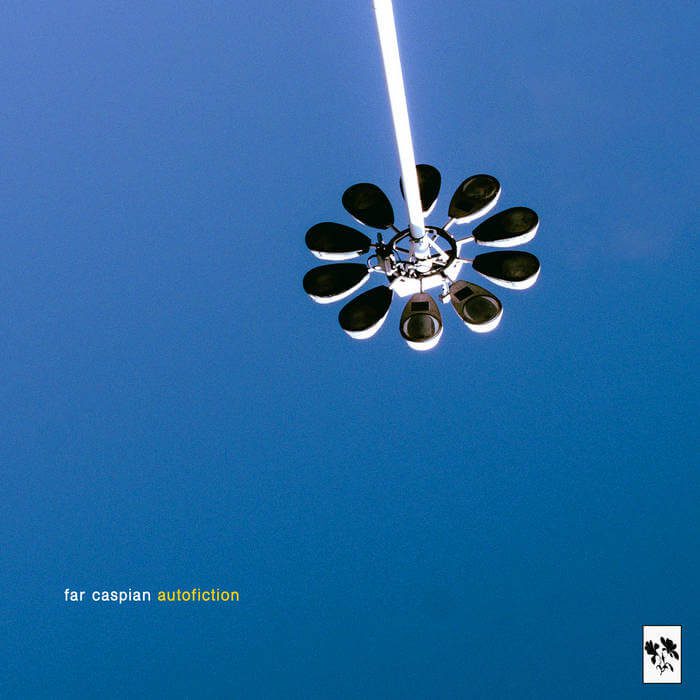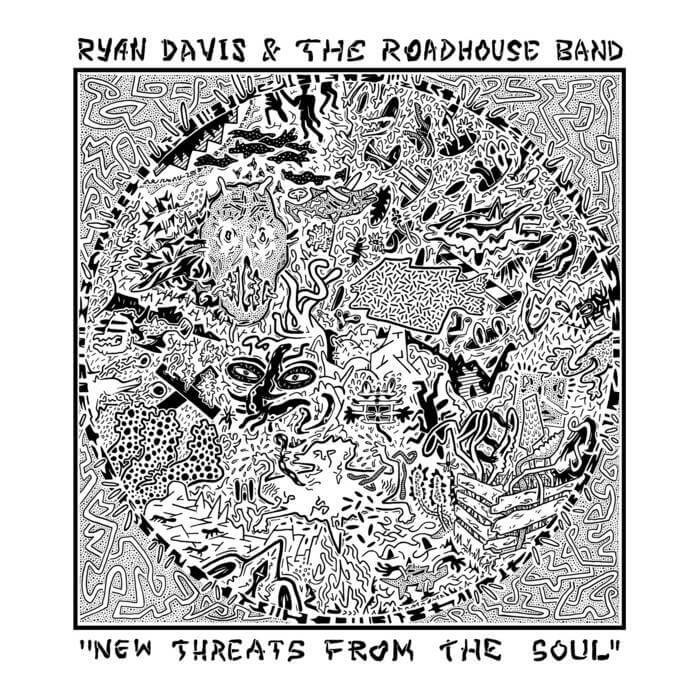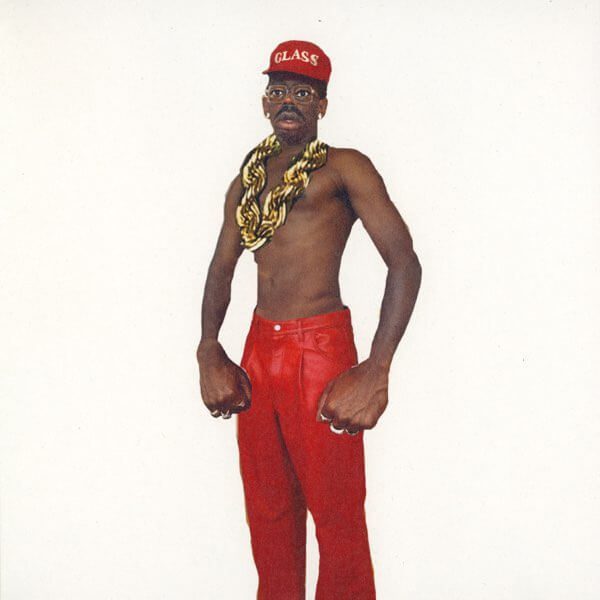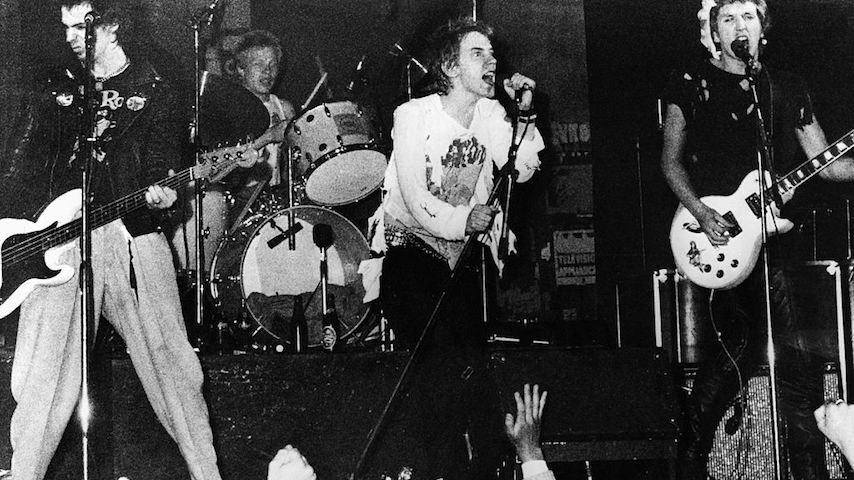Paste is the place to kick off each and every New Music Friday. We follow our regular roundups of the best new songs by highlighting the most compelling new records you need to hear. Find the best new albums of the week below, from priority picks to honorable mentions.
Cory Hanson: I Love People
Most of the new music I seek out is inherently good. At worst, some of it is above-average but not exciting enough to get a replay out of me. It’s all just in one ear, out the other. But I am pleased to report that Cory Hanson remains far above-average. In fact, the Los Angeles guitarist-vocalist has been socking no-doubt-about-it dingers to left-center for some time now. And Hanson, the guy who made one of my favorite albums of 2023 and the guy who fronts the very good band Wand, will put out another solo album in 2025—I Love People, a far more easy-on-the-ears title than Western Cum was for some two years ago. On “Bird On a Swing,” Hanson steps away from the shredding that defined his last release under his own name. This isn’t an immediate continuation of “Wings” or “Horsebait Sabotage.” It’s less Thin Lizzy and more 400 Unit. Seriously: Hanson is conjuring some major Jason Isbell vibes on these choruses, but with a sun-dappled, SoCal charm. But make no mistake about it, Hanson is still flirting with cowboy idyllics just as sweetly, this time with a hint of commentary on the bitter state of our Union. “I’ve rode on the darkest range, I’ve worked a thousand graveyard hours,” he sings, through a menagerie of fiddle, piano, and country chords. “I have no blood left in my veins, I gave it all up to the empire.” A song like this is a line drawn in the sand—about the “sadness in my skull,” about a kindness shown toward strangers. How much are you willing to pay to be free? How much will you sacrifice just to have your music remembered? “You may break your heart,” Hanson argues, “but you’ll still be alive.” He wrote “Lou Reed” after reading Laurie Anderson’s obituary for the Velvet Underground founder in the Long Island East Hampton Star. The song is not just a verbatim rip-off of Anderson’s words pulled into a cosmic, elegiac piano ballad of pretty images, but an archetypical tribute of the least archetypical rock star of his generation. When the West Coast strings bleed into an East Coast woodwind, “Lou Reed” turns into Hanson’s greatest widescreen sprawl yet. The melancholy grows especially supernatural and epic when he cries out the line I’ve been humming all week: “All of the fairytales have fallen on bad times.” —Matt Mitchell [Drag City]
Far Caspian: Autofiction

Joel Johnston, the man behind Far Caspian, has been fiddling with a tape recorder for 8 hours now. This interview, he says, is a welcome distraction. Calling from his studio in Leeds, Johnston’s recent purchase is an extension of a newfound desire to try new things. It’s a calling he couldn’t have seen himself heeding a few years ago, at least not gracefully, but lately he’s been riding on a high. It’s a throughline that has permeated his life in recent months and come to shape his new record Autofiction. Johnston’s third LP as Far Caspian, the album is made up of stories of shifting perspectives, deepening relationships, and a lifelong navigation of Crohn’s. “For the first time in a long time, I’ve been feeling really good with my Crohn’s and my mental health. With all those things coming together at the right time, I’ve been able to let go of that inner critic and finally just express myself. I really wanted to celebrate that,” he said. Stepping into this new mindset was not an overnight process. For Johnston, it’s been a gradual shift across a wobbly 10-year period. Framed by melancholy guitars and clean production, Johnston says the way he felt while making Autofiction was much different from the projects of his past. While previous works Ways to Get Out and The Last Remaining Light were acclaimed, Johnston felt a discontent between the substance of the songs and the thoughts he had while making them. —Camryn Teder[Tiny Library]
Folk Bitch Trio: Now Would Be a Good Time

Emotional growth, and the mess that comes with it, is embedded into all the songs on Now Would Be A Good Time. It’s in the quietly furious unraveling of “Hotel TV,” the surrealist fuzz of “Moth Song,” and the sarcastic delivery of “Am I lucky or am I just sane?” on “God’s A Different Sword.” (“When it gets overly earnest and serious, you have to bring in some humor,” Pilkington says. “Otherwise, I think it’s just a little too boring.”) It’s all interpersonal static and intrusive thoughts; slippery feelings that resist easy framing. The result is an astonishing record, music anchored by harmonies so instinctual they sound almost telepathic. It’s hard not to associate Folk Bitch Trio with their genre namesake. But the band views folk with more fluidity, leading to some nods to the greats—a Ted Lucas cover, Mitchellian acoustics on “Mary’s Playing the Harp.” But the spirit of folk music isn’t just in the jangly acoustics and tight harmonies. It’s also in the depth of storytelling, the unflinching vulnerability, and the deep-rooted friendship of Folk Bitch Trio. —Cassidy Sollazzo [Jagjaguwar]
Read: “Folk Bitch Trio: The Best of What’s Next”
Golomb: The Beat Goes On

Golomb was a solid debut; entries like the trancelike reverie “One Thousand Million” and the Xenia-led, post-punk-ish scorcher “Western Threshold” hold up as some of the band’s best songs. However, for the uninitiated, The Beat Goes On is a perfect entry point into Golomb’s catalog. The band comes to life when a needle drops on the title track—a power-pop dynamo supercharged with muscular power chords, the steady heartbeat of Hawken Holm’s drumming, and those instantly gratifying Mickey-Xenia harmonies. Insistent, propulsive, and packed with hooks slashing through fogs of feedback, the following ten songs maintain the opening salvo’s momentum; every pummeling wall of sound seems to seep through the speakers, overtaking the senses. Hell, “Real Power”—the album’s anthemic lead single, and (for my money) one of the best rock songs of the year—makes me want to break into a run, and I hate running. It’s hard to imagine a song like that appearing on Golomb, which smeared at the edges even at its most energetic. The band’s pivot toward a poppier sound was more instinctual than intentional; as Xenia Shuman puts it, it was something they were “leaning into.” However, it seems inevitable that The Beat Goes On ended up being their most accessible record to date, considering the goal they did enter the studio with last October: make a classic. —Anna Pichler [No Quarter]
Read: “Golomb: The Best of What’s Next”
Indigo De Souza: Precipice

Upon initial listen, Precipice, the new album from indie powerhouse Indigo De Souza, feels almost mannered. Any Shape You Take, her 2021 breakout, was a raw nerve of musicality, every song threatening to erupt into emotional violence and pitch-shattering vocal lacerations, as though she were cutting through pop music’s standard build-release-repeat by opening up a vein—all release, all the time. It was almost too cathartic. And while 2023’s All Of This Will End started to make inroads to a more overt pop direction (while also covering a more sonically diverse array of sounds and styles), the electronic drum beats and synthesizers came across like friendly overtures toward a groove-friendly palette, previously considered too slick to capture such jagged feelings. A greater balance of sweet with the sour, in other words. And in making an even more decisive pivot towards accessible songwriting and pleasing melodies, the artist has entered what could now be reasonably considered a full-on pop phase. But unlike so many before her, who traded out distortion and raw production values for too-sunny synths and clean, commercial-ready smoothness—losing what made them distinctive in the process—De Souza has found the musical sweet spot between authenticity and accessibility. The songs on Precipice are less rough, to be sure; there are times her voice is so controlled and steady, you almost wonder if this is the same person who descended into literal shrieks on Any Shape You Take’s “Real Pain.” To wit: Opener “Be My Love” finds her delivering a classic romantic come-hither, before rising into falsetto in a series of notes so precise, she sounds like, well, a pop singer. —Alex McLevy [Loma Vista Recordings]
Read: “Indigo De Souza Charts a New Beginning”
Post Animal: IRON

While most of the tracks on IRON look at Post Animal’s connections with people, others are about their relationship with the world. “Pie In the Sky” is a hunky-dory, quirky tribute to the moon above us, while “What’s a Good Life” reckons with what makes a meaningful life. “What’s a favorite thing you’ve done?” they ask atop shimmering synth lines. The high synth parts soar at the start, giving way to lower percussive tones in later verses. The contrast makes for an interesting listen, although a fusion of the two sounds throughout would have given this track a more expansive sound. The band continues an examination of life on “Setting Sun,” where driving drums and synths introduce a sunny rock ballad celebrating the perseverance it takes to survive. (With its stacked guitars and theme of embracing the moment, the song feels like a harder take on 2022’s “Love Gibberish.”) While “Setting Sun” initially retains a traditional rock structure, a delicate piano interrupts the guitars in the bridge, serving as a satisfying palate cleanser that falls effortlessly into the last half of the track. IRON is chock-full of solid guitar riffs and addictively sunny verses. While some songs don’t quite stack up to the others, and some are inconsistent with the overall theme, it’s clear the band had fun making this record. The energetic glee of their rekindled friendships emanates throughout the songs, solidifying IRON as the best Post Animal album since 2020’s Forward Motion Godyssey. —Camryn Teder [Self-Released]
Read: “Post Animal Rekindle Old Flames on IRON”
Pretty Bitter: Pleaser

Likewise, Pretty Bitter—Mel Bleker, Miri Tyler, multi-instrumentalist Zach Be, and drummer Jason Hayes—made Pleaser a dream house of sounds. It’s the synthy D.C. indie-pop band’s first LP with professional studio polish, featuring vocals tracked at Type One Studio in Chicago and drums from The Hangar in Columbia, Maryland. It’s their first album to feature the banjo, as introduced by Be (albeit by way of twinkly, American Football-type riffing), and it marks the first time Bleker wrote their own vocal melodies instead of fitting lyrics to their bandmates’ demos. As a whole, Pleaser preserves the anthemic hooks and homey dream pop atmosphere of its predecessor, 2022’s Hinges, but with the new wrinkles of an older and wiser band. “[Pleaser] is about aging and death and friends and love,” they explain. “The way that time changes the experience of these really, really big emotions, positive and negative and neutral.” Bleker points to “Outer Heaven Dude Ranch,” an all-out belter of a single, as the summation of the album’s themes. “The line, ‘I’m ten years older waving the same white flag’ is like, Jesus Christ, if I still have the same issues and the same heavy sadness that I did when I was 20, or 16, then why does it look so different now?” In keeping with the theme of growing older, many of Pleaser’s songs deal with mortality, though with multi-colored complexity, and often against a backdrop of bubbly, arpeggiated synths. “Bodies Under the Rose Garden” takes place in the aftermath of a righteous murder, and it finds Bleker contemplating their own burial (imagine a pensive sequel to The Chicks’ “Goodbye Earl” with a sticky midwest emo riff that passes from guitar to bass). There’s also the gut-punch bridge to “Thrill Eater,” where Bleker mourns: “The lifesavers I have known / Have taken their own / Please tell me when you get home.” —Taylor Ruckle [Tiny Engines]
Read: “Pretty Bitter Build a Musical Dream House”
Ryan Davis & the Roadhouse Band: New Threats From the Soul

As a survey of the state love leaves us in, New Threats From the Soul is unflinching; in lieu of spewing vague sentiments, Ryan Davis channels loss into precise, tangible imagery. On the desperate and borderline creepy vignette “Monte Carlo / No Limits”—a sort of spiritual successor to the Replacements’ equally desperate, not-so-creepy dirge “Answering Machine”—a non-functioning doorbell delivers a crushing blow to the narrator’s efforts towards reunion with an ex (it “doesn’t work, but it don’t need to if there’s no one at home”). Mundane tragedies, like “daffodils dyin’ in a theme park pint glass,” take the foreground, while the celestial and conceptual are defanged, distorted into bit parts and props: the moon’s face is scarred with acne; life is cast as a blundering, game-show host type (who does it “think it is to deprive its contestants of joy?”); time is neither friend nor foe, “more like one of the guys from work.” New Threats From the Soul is jam-packed with arresting turns of phrase, but never flounders under their weight—each witticism feels earned and essential rather than shoehorned or self-indulgent.
Instead, each line contributes to an exhaustive document of how extensively heartache blurs our lenses—how we find it everywhere, in everything. How it finds us. By equal measure, the familiarity of this worldview is devastating and, well, pretty damn hilarious. On “Mutilation Springs,” for example, when Davis bluntly asks, “What even am I?!,” I’m not sure whether to chuckle at the dissonance between his hammy delivery and the question’s existential heft or to wince at the pathetic mental image it conjures: a past-prime lounge singer working at some sleazy joint, unable to suppress a budding existential crisis on the job. Though Davis’ vocal range isn’t quite dazzling, moments like these attest to the rich expressiveness of his singing; with slight vocal modulations, he shades even his most plainspoken lyrics with nuance. It’s an understated ability he perhaps employs best on “Better If You Make Me.” While the last-ditch apology “I could change for the better if you make me” could easily come across as tossed-off, the way his warble gradually frays into a raw, punk-ish howl with each repetition conveys the rising panic of someone who’s being forced to face a relationship past salvaging—and, worse, to accept that it’s deteriorated by his own fault. —Anna Pichler [Sophomore Lounge]
Read: “Ryan Davis & the Roadhouse Band Delight in Spite of New Threats From the Soul”
Tyler Childers: Snipe Hunter

If there’s one thing we know about Tyler Childers, it’s that he will choose to zag when the world expects him to zig, and Snipe Hunter is mostly a rollicking twang-rock and roll record full of brand new tunes and hard-won wisdom, big ideas about the big ol’ world, expansive arrangements for his band the Food Stamps, and a persistent, palpable rawness courtesy of the legendary Rick Rubin, who produced the album, and Sylvan Esso’s Nick Sanborn, whom Childers pulled in to make the songs “weirder,” Sanborn told GQ. Things get weird right away. The opening track, “Eatin’ Big Time,” is a thick cut of greasy boogie-blues in which Childers both eats the rich and flexes his own homegrown success: “With albums gold and platinum overflowing to the ceiling,” he howls against a fuzzed-out, loping groove, “eatin’ big time is a feelin’ with the friends that I have made.” Elsewhere, he turns a high-energy country tune into a hilariously vivid warning for those who’ve crossed him (“Bitin’ List”), dishes out country-life advice backed by swampy doom-blues (“Watch Out”) and weaves lessons he’s learned about hunting and hatred into one seething lyric while the Food Stamps show off their punk-rock chops (“Snipe Hunt”). Especially striking is a pair of back-to-back songs near the end of the album that feel intertwined. First up is “Tirtha Yatra,” a honky tonk tune in which Childers dreams of a spiritual journey to India to “get a better understandin’ of the culture that’s surroundin’ all the scriptures (he’s) been poundin’.” That’s followed by “Tomcat and a Dandy,” a droning waltz built from scratchy fiddle, pump organ, Hare Krishna chanting, and reflections on mortality. Here, Childers’ unique confluence—his deep understanding of the rural American existence, his wide-eyed world-wandering, and his personal spiritual journey—come together in a way that feels authentic, fascinating, and downright psychedelic. —Ben Salmon [RCA]
Tyler, The Creator: DON’T TAP THE GLASS

Released on Monday after some weekend teasing, Tyler, The Creator ninth studio album is his most unpredictable effort in a decade. It’s genre fluidity is more obvious that CHROMAKOPIA or IGOR, as Tyler fiddles with house and techno music, tossing in some rap asides and synth-pop bonafides for good measure. The feature list is good, too, sporting names like Sk8brd and Yebba. The sample line-up is out of this world, as well. Here’s just a taste: 12 Gauge’s “Let Me Ride,” Ray Parker Jr.’s “All in the Way You Get Down,” and Crime Mob’s “Knuck If You Buck.” On “I’ll Take Care of You,” Tyler even samples his own song, “Cherry Bomb.” The highlight track is “Don’t You Worry Baby,” assisted by singer and co-writer Madison McFerrin. The song features her soulful interplay where, in the past, Tyler would have pitch-shifted his own vocals. It’s one of the rapper’s more inventive collaborations, one that finds him relinquishing full control. It allows McFerrin to be the rightful star of the song, as her “I’ll give you the world before you fall asleep” line provides great contrast to Tyler’s repetition of “Damn, girl, you better move your hips.” In a statement about Don’t Tap the Glass, Tyler shared: “THIS ALBUM WAS NOT MADE FOR SITTING STILL, DANCING DRIVING RUNNING ANY TYPE OF MOVEMENT IS RECOMMENDED TO MAYBE UNDERSTAND THE SPIRIT OF IT. ONLY AT FULL VOLUME.” True to his intentions, “Don’t You Worry Baby” is a totally ‘80s prom breakdown injected with modern trap flavor and sex-on-a-stick swagger. As the man himself demands, “Let me rock, pop it, shake it.” —Matt Mitchell [Columbia]
Other Notable New Album Releases This Week: Alice Cooper Band: The Revenge of Alice Cooper; Freddie Gibbs & The Alchemist: Alfredo 2; GWAR: The Return of Gor Gor; Madonna: Veronica Electronica; Nihilistic Easyrider: Deluxe Edition; Paul Weller: Find El Dorado; Quadeca: Vanisher, Horizon Scraper; QUINN XCII: LOOK! I’m Alive; The Dirty Nil: Lash; Why Bonnie: The Bedroom EP; Yoshika Colwell: On the Wing




